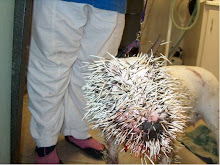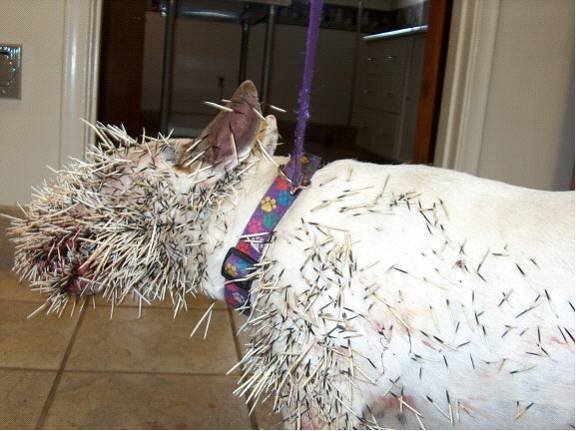As I usually get dogs and their owners shopping in Woofles and Meowz for varous dog treats, dog toys or equipment but there is a good number of people here for what the "Meowz" part can provide.
Cat toys, catnip, treats etc are all here but I sometimes get accused of pandering to the Woofles especially in the advice or help arena so the following is a good 40 tips on cat safety that is a followup to the pet safety tips on a previous blog...all the best!
MEOW!!!
1. You know your cat. If she's acting strange, err on the side of caution: Take her to the vet.
2. Antifreeze is sweet but deadly. If your car leaks, get it fixed, and keep antifreeze far out of reach from your pets. Even one teaspoonful is fatal.
3. Do not underestimate your cat; it can fall out of a window, says Pat Coughlin, a cat owner in Norway. Install protective screens or storm windows to let your cat safely enjoy the view.
4. If your cat tends to chew electrical cords, keep her in a cord-free room when unsupervised, says Larry Lachman, an animal behaviorist in Carmel, Calif. Also, spray cords with safe spicy or bitter-tasting products.
5. If you use clumping litter, groom your cat frequently to remove particles that may accumulate and interfere with elimination.
6. Keep your cats indoors. They'll be healthier and happier, says Ceridwen Attwood, a cat owner in Washington. Outside they're exposed to other animals, risk getting run over by cars and are exposed to the elements.
7. Do not let in strays just for the heck of it, Lachman says. Having strange cats around can overstress your own cat, which may lead to fighting, biting and soiling or spraying around the home.
8. Never hit your cat. Use spray bottles with water if discipline is necessary. Physical punishment doesn't teach your cat appropriate behavior.
9. Consider using clay litter for kittens. If your cat accidentally ingests some litter particles, clay is nontoxic in small quantities.
10. Safely confine your cat when workmen or visitors are in your home [to prevent escape], Lachman says. A bathroom, laundry room, bedroom or cat carrier is ideal for this purpose.
11. Only use cat-specific flea preventives in vet-approved dosages to avoid triggering a dangerous reaction in your cat or kitten.
12. If at all possible, get your cat first, then add a dog to the household, not the other way around, Lachman says. This may reduce fighting over territories.
13. When introducing a kitten to your household, provide food, water, a litterbox, scratching post, bed and toys, and confine your kitten to a safe room (a bathroom or spare bedroom) for the first few days, and any time you cannot directly supervise him. A pheromone diffuser in this safe room can help keep a cat calm.
14. Keep all yarn, string, thread and needles in a secure cabinet. Yarn or string can become caught on a cats barbed tongue and may be swallowed.
15. Don't give cows milk to kittens or adult cats because it may cause gas and diarrhea.
16. Certain human foods and medicines are extremely harmful to cats. Do not leave chocolate, onions or medicines out on counters, Lachman says.
17. Keep your cats identification tag or microchip information current in case your cat wanders away.
18. Train your cat to stay away from the stove at all times, even if not in use, by squirting him with a spray bottle when he gets too close.
19. Do not feed your cat dog food. Cats require different nutrients and more protein in their diets than dogs do.
20. Do not attempt to pick up your cat when he shows signs of defensiveness or aggression. Although your cat adores you, he may still bite or scratch you out of fear.
21. Kittens love to explore, so block their access to the area behind the refrigerator, bookcase or couch so they won't get stuck or injured.
22. Before starting your engine, honk your car horn to scare away any cats sleeping in the engine compartment.
23. Gently handle your kitten on a regular basis to socialize her and prevent behavior problems associated with lack of contact.
24. Do not leave a cat or kitten [unsupervised] with a child under age 7, Lachman says. Kids under age 7 have poor impulse control and can accidentally or intentionally hurt the cat.
25. Cats will make a plaything out of any item, so keep blind cords out of your cats reach to avoid strangulation.
26. With your veterinarians guidance, assemble a kitty first-aid kit and keep this on hand for emergencies.
27. Never leave an iron, hot or cold, sitting on an ironing board. The cord may look like a toy to your kitten and she could pull the iron down on herself.
28. Although cats enjoy playing with the plastic ring from milk jugs, these can be chewed apart and swallowed very easily, says Scott Ransom, a cat owner in Oregon. [My] cat [was] in intensive care for a week once because of this mistake.
29. Cats love moving water, so keep the toilet lid closed to prevent drowning.
30. Don't give cats medicines that aren't intended for cats, says Rosalie Marley, a veteran animal shelter worker in Nebraska. Aspirin, ibuprofen and acetaminophen can be deadly.
31. Keep the clothes dryer and dishwasher shut when not in use. Check inside these appliances before using. Cats love to hide in warm, dark places, but these appliances are fatal when in use.
32. When you pick up your cat, support his chest and legs so he feels safe and does not struggle. This protects you from scratches and bites, too.
33. Some plants are poisonous to cats, Coughlin says. The ASPCA website has a list of toxic and nontoxic plants.
34. Always check your cats whereabouts before closing drawers, closets or doors to avoid accidentally locking your cat in.
35. Your cat can be a danger to smaller pets such as reptiles, fish, birds and rodents. Keep your cat away from other pets when unsupervised.
36. When adding a second cat or kitten to your household, clear his health by your vet prior to bringing him home, so you do not expose your first cat to possible illness.
37. Check your garage door before closing it, to avoid injuring any cats perched there.
38. Install baby locks on cabinets where you keep bug spray, household cleaners or medicines. Your smart cat may learn how to open cupboard doors!
39. Invest in covered wastebaskets and garbage cans for your home to prevent cats from finding dangerous items such as chicken bones or dental floss.
40. Always use a carrier when transporting your cat. Even if your cat loves car rides, she may get underfoot or escape if startled.
Saturday, November 1, 2008
Subscribe to:
Post Comments (Atom)

































No comments:
Post a Comment